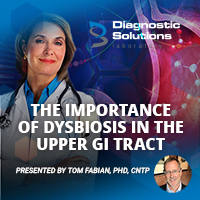The Importance of Dysbiosis in the Upper GI Tract
 The term “dysbiosis” denotes imbalances or disruptions in the microbiome that are thought to contribute to a long and growing list of chronic diseases and conditions. To date, microbiome research has largely focused on dysbiosis in the colon, which is typically assessed via stool sampling.
The term “dysbiosis” denotes imbalances or disruptions in the microbiome that are thought to contribute to a long and growing list of chronic diseases and conditions. To date, microbiome research has largely focused on dysbiosis in the colon, which is typically assessed via stool sampling.
Recent research indicates that the oral microbiome may also be involved in certain disease processes. Dysbiosis in other areas of the gastrointestinal tract has been less extensively explored, but emerging evidence indicates that dysbiosis in these areas may also have important impacts on health.
In this presentation, we will explore what’s known about dysbiosis in the upper GI tract (especially in the stomach and upper small intestine), and how advanced DNA-based stool testing may provide important clinical insights.
Speaker
 Tom Fabian, PhD, CNTP
Tom Fabian, PhD, CNTP
Dr. Fabian is a functional nutrition practitioner, consultant, educator, speaker, and former research scientist. His primary expertise is in how the microbiome interacts with the digestive, immune and nervous systems, and how it influences metabolic processes. He has developed online educational programs for practitioners seeking in-depth education in the microbiome and related topics. He also has extensive experience in the areas of aging and healthspan optimization, both through his previous research experience as well as his more recent experience as a functional health practitioner.
Thank you for downloading!
















